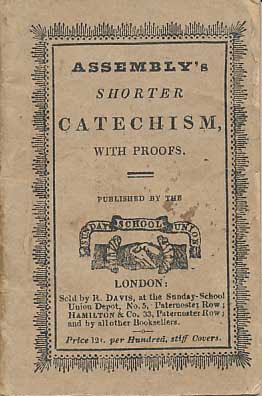This Day in Presbyterian History:
The Practice of Repentance
 With little action by Presbyterians in America on this day, we turn on this day, September 15, to Shorter Catechism No. 87 which asks and answers “What is repentance unto life? A. Repentance unto life is a saving grace, whereby a sinner, out of a true sense of his sin, and apprehension of the mercy of God in Christ Jesus, does, with grief and hatred of his sin, turn from it unto God, with full purpose of, and endeavor after, new obedience.”
With little action by Presbyterians in America on this day, we turn on this day, September 15, to Shorter Catechism No. 87 which asks and answers “What is repentance unto life? A. Repentance unto life is a saving grace, whereby a sinner, out of a true sense of his sin, and apprehension of the mercy of God in Christ Jesus, does, with grief and hatred of his sin, turn from it unto God, with full purpose of, and endeavor after, new obedience.”
The last catechism we considered, which was on September 4, and dealt with the definition of saving grace, and this one on repentance, are linked in that they are twin graces. Faith must precede repentance however in the order of nature. The writer to the book of Hebrews said in chapter 11:6 that “without faith it is impossible to please him, for whoever would draw near to God must believe that he exists and that he rewards those who seek him.” (ESV) Saving faith comes first, but repentance unto life is so closely connected with it in the sinner’s experience, that we may not be able to separate them in a concise way.
Repentance is unto life. The Messianic Jews in Acts 11:18 rejoiced that as a result of Peter’s ministry to the Gentiles, “God had granted repentance that leads to life.” (ESV) Further it is “a saving grace,” in that it is the free gift of God. The previous text in Acts 11 speaks of “God granting repentance.” He is the author of repentance.
Repentance comes first from the knowledge of sin and in particular his sin. It is “out of a true sense of his sin” that repentance comes. A true repentant, under the enlightening of the Holy Spirit, views sin, and his sin, not only dangerous to his soul, but also odious because it is contrary to the holy nature and righteous law of God. Further, repentance is followed by “an apprehension of the mercy of God in Christ.” Because of who Christ is, and what He accomplished in our redemption, we as sinners can have the mercy of God upon us.
The two ingredients of repentance include first “a grief and hatred of sin,” and our sin in particular. The godly sorrow of the penitent is for his sin committed against God, as rebellion against his rightful authority, as a violation of His holy law, and certainly as an ungrateful return for all His goodness. It includes a hatred of sin. The Psalmist David stated in Psalm 119:128 that he hated “every false way.” As a result of this, the repentant person “returns from it unto God, with full purpose of, and endeavor after, new obedience.” True repentance results in actions which are now pleasing to God.
Words to live by: Repentance includes small sins and great sins. It includes general sins and particular sins. We need to include confession of sins in every prayer we pray to the heavenly Father. Confession attests the sincerity of repentance. There must be a complete change of mind and manner of life in biblical repentance.
Through the Scriptures: Ezekiel 15 – 18
Through the Standards: The fourth petition of the Lord’s Prayer, according to the Shorter Catechism.
WSC 104 — “What do we pray for in the fourth petition?
A. In the fourth petition, (which is, Forgive us our debts, as we forgive our debtors,) we pray, that God, for Christ’s sake, would freely pardon all our sins; which we are the rather encouraged to ask, because by his grace we are enabled from the heart to forgive others.”
Tags: Christ Jesus, Holy Spirit, Lord Prayer, Scriptures Ezekiel

No comments
Comments feed for this article